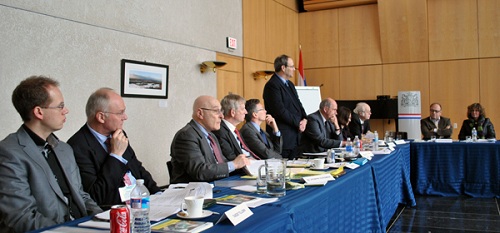International Collaboration Advances Transportation Research, Minimizes Parallel Efforts [2]

Duplication of efforts is costly, whether it happens within a single organization or across national boundaries. Since 1998, Volpe and a Dutch research organization have exchanged transportation research information and experience under a mutually beneficial agreement.
Providing a framework for collaboration, this agreement promotes synergy and advances research. Volpe and the Rijkswaterstaat (RWS) research group within the Netherlands Ministry of Infrastructure and the Environment (RWS) have found that working together to solve mutual problems helps them develop solutions to improve transportation systems without the costly duplication of parallel national efforts.
Volpe and RWS hold annual research workshops on specific topics of mutual interest. This year’s workshop was recently held at the Netherlands Embassy on the heels of the Transportation Research Board’s annual meeting in Washington, D.C. The topic was “Transportation Infrastructure Resilience and Adaptation.”
According to Volpe agreement coordinator William Lyons, “The annual workshop provides a great forum for exchanging ideas, sharing research, and identifying topics and activities for the RWS, Volpe, and our partners.”
“It was a win-win,” Lyons said of this year’s workshop. “The Dutch and European colleagues took back insights on the systematic approach MPOs and DOTs are developing to respond to climate risks and responses in transportation planning. |
This year, the Federal Highway Administration (FHWA) also sponsored the workshop. Invited partners interested in planning and designing for transportation infrastructure resilience and climate adaptation participated. The workshop themes included:
- Accounting for climate change (including sea level and changing precipitation patterns) in infrastructure design, asset management, and maintenance
- Discussing adaptive roadway design strategies and challenges
- Integrating transportation infrastructure adaptation projects into multi-sector asset protections
- Examining tools for assessing costs and benefits of adaptation options
Representatives from the Netherlands, Denmark, and Norway presented European perspectives with case studies on topics like risk assessments and roadway infrastructure and incorporating precipitation projections into infrastructure design.
U.S. r epresentatives from Volpe, FHWA, metropolitan planning organizations (MPO), and state Departments of Transportation (DOT) provided perspectives on regional and statewide resilience planning and climate adaptation activities.
epresentatives from Volpe, FHWA, metropolitan planning organizations (MPO), and state Departments of Transportation (DOT) provided perspectives on regional and statewide resilience planning and climate adaptation activities.
“It was a win-win,” Lyons said of this year’s workshop. “The Dutch and European colleagues took back insights on the systematic approach MPOs and DOTs are developing to respond to climate risks and responses in transportation planning.
As a nation surviving below sea level, the Dutch are the gold standard for adaptation to extreme weather and climate change. They provided innovative transportation, land use, and technological strategies to anticipate and respond to extreme weather. The Dutch polder model of societal cooperation is critical to their climate resilience. Dutch speakers described their national and local approach to climate change adaptation and resilience that combines:
- Preparedness and crisis management, with evacuation plans in place.
- Land use planning to consider risk in new developments.
- Protection, with major investments in infrastructure, prioritized by risk, and use of storage areas for sea level rise.
This balanced approach allows the Netherlands to continue to adapt to its high vulnerability, and provides important insights for the U.S. transportation sector.
Topics from Past Volpe/RWS Research Workshops
1. Road Safety Management (2000)
2. Knowledge Management and Capacity Building (2006)
3. Congestion Policy and Pricing (with FHWA International Office) (2007)
4. Safety and Human Factors Research (2009)
5. Planning for Major Inter‐regional Projects and Mega‐regions (2009)
6. Intelligent Transportation Systems (2010)
7. Traveler Perception (2011)
8. Highway Planning Within an Integrated Planning Process (2012)
9. Role of Performance Measures in Integrated Transportation Planning (2013)
